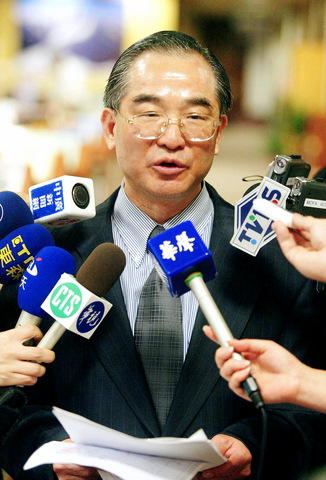The Ministry of Foreign Affairs hopes to convene a 15th round of fishery negotiations with Japan to resolve the problems incurred as a result of their overlapping exclusive economic zones, a foreign ministry official said yesterday.
Gary Lin (林松煥), director of the ministry's Department of East Asian and Pacific Affairs, made the remarks one day after nearly 50 Taiwanese fishing boats converged in waters northeast of the country to protest against Japanese patrol ships, which chased them away from the disputed area.
The fishermen initially wanted to confront the Japanese patrol boats but the protest fizzled out when no Japanese patrol boats showed up, just reconnaissance planes.

PHOTO: CNA
Lin said that before Taiwan and Japan negotiate a provisional boundary, Taiwanese fishermen should stay within the patrol line of Coast Guard Administration (CGA) patrol boats.
He said that following the protest, the ministry had lodged a protest with the Japanese authorities urging them to exercise self-restraint and asked for a 15th round of talks.
At issue is the formulation of a Japanese law in 1996 regarding its exclusive economic zone and continental shelf, which included parts of Taiwan's exclusive economic zone within its the Japan's economic zone. The two countries have conducted 14 rounds of talks on the issue since 1996.
Meanwhile, Democratic Progressive Party (DPP) legislators Wang Tuoh (王拓) and Hsu Kuo-yung (徐國勇) yesterday urged Japan to conduct talks with Taiwan as soon as possible.
Wang said that the fishermen's move shows that they can no longer tolerate "the pirate acts of the Japanese patrol boats" and that they have become desperate regarding the government's lack of resolve to protect them.
He said that he has asked the Fisheries Administration to confront the Japanese patrol boats as a way of pressuring Tokyo to come to the negotiation table.
If Japan still won't talk, Wang said, he would not rule out the possibility of mobilizing fishermen to stage a protest at the Interchange Association, Japan's representative office in Taipei.
Hsu said Japan has turned a deaf ear to Taiwan's appeal for talks for fear of China.
Hsu asked the foreign ministry, the CGA and the Fisheries Administration to form a task force to review the issue.
also see story:
Do more to protect fishermen, blue camp says

AIR SUPPORT: The Ministry of National Defense thanked the US for the delivery, adding that it was an indicator of the White House’s commitment to the Taiwan Relations Act Deputy Minister of National Defense Po Horng-huei (柏鴻輝) and Representative to the US Alexander Yui on Friday attended a delivery ceremony for the first of Taiwan’s long-awaited 66 F-16C/D Block 70 jets at a Lockheed Martin Corp factory in Greenville, South Carolina. “We are so proud to be the global home of the F-16 and to support Taiwan’s air defense capabilities,” US Representative William Timmons wrote on X, alongside a photograph of Taiwanese and US officials at the event. The F-16C/D Block 70 jets Taiwan ordered have the same capabilities as aircraft that had been upgraded to F-16Vs. The batch of Lockheed Martin

GRIDLOCK: The National Fire Agency’s Special Search and Rescue team is on standby to travel to the countries to help out with the rescue effort A powerful earthquake rocked Myanmar and neighboring Thailand yesterday, killing at least three people in Bangkok and burying dozens when a high-rise building under construction collapsed. Footage shared on social media from Myanmar’s second-largest city showed widespread destruction, raising fears that many were trapped under the rubble or killed. The magnitude 7.7 earthquake, with an epicenter near Mandalay in Myanmar, struck at midday and was followed by a strong magnitude 6.4 aftershock. The extent of death, injury and destruction — especially in Myanmar, which is embroiled in a civil war and where information is tightly controlled at the best of times —

Taiwan was ranked the fourth-safest country in the world with a score of 82.9, trailing only Andorra, the United Arab Emirates and Qatar in Numbeo’s Safety Index by Country report. Taiwan’s score improved by 0.1 points compared with last year’s mid-year report, which had Taiwan fourth with a score of 82.8. However, both scores were lower than in last year’s first review, when Taiwan scored 83.3, and are a long way from when Taiwan was named the second-safest country in the world in 2021, scoring 84.8. Taiwan ranked higher than Singapore in ninth with a score of 77.4 and Japan in 10th with

China's military today said it began joint army, navy and rocket force exercises around Taiwan to "serve as a stern warning and powerful deterrent against Taiwanese independence," calling President William Lai (賴清德) a "parasite." The exercises come after Lai called Beijing a "foreign hostile force" last month. More than 10 Chinese military ships approached close to Taiwan's 24 nautical mile (44.4km) contiguous zone this morning and Taiwan sent its own warships to respond, two senior Taiwanese officials said. Taiwan has not yet detected any live fire by the Chinese military so far, one of the officials said. The drills took place after US Secretary